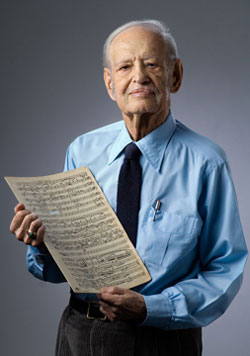

  |
|
|
||||||||||||||||||||||
|
FMS FEATURE... May 30, 2007 Fred Steiner Receives Oberlin Honorary Doctorate Renowned composer returns to his alma mater for accolades  Steiner graduated from the Oberlin Conservatory of Music – one of the nation's oldest and most prestigious musical institutions – with a degree in composition in 1943. He went on to write for radio and television, including the familiar themes for Perry Mason and Rocky & Bullwinkle, and considerable music for the original Twilight Zone and Star Trek series. Over the years, he also composed for Gunsmoke, Hawaii Five-0, Hogan's Heroes, Rawhide, The Untouchables, The Andy Griffith Show, Tiny Toon Adventures and the miniseries Blood Feud. His feature-film scores include Run for the Sun, Time Limit, The St. Valentine's Day Massacre and (in collaboration with Quincy Jones and other writers) The Color Purple, for which he received a 1985 Oscar nomination. In recent years, Steiner has turned his attention to musicology, specifically as it relates to classic film music. His 1974 essay on Bernard Herrmann's Psycho is believed to be the first known musicological analysis of a film score. In 1981, he was awarded a doctorate in musicology from the University of Southern California for his landmark thesis on the early career of composer Alfred Newman. He has written scholarly articles on film music for The Cue Sheet, Film Music Quarterly and the Quarterly Journal of the Library of Congress; taught film-music history, composition and orchestration at USC for several years; and has lectured at other colleges and universities around the country. He was one of the founding members of The Film Music Society and served on its board for many years. |
Search
Past Features
|